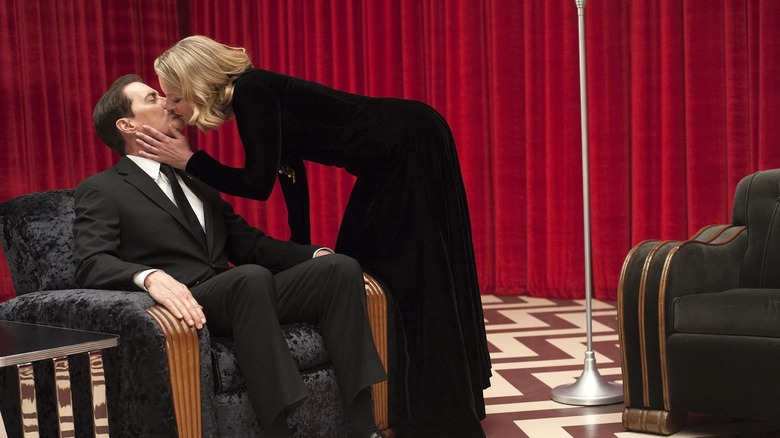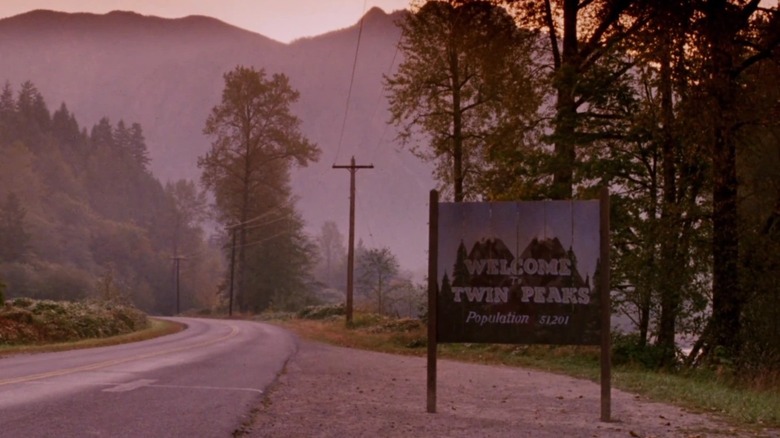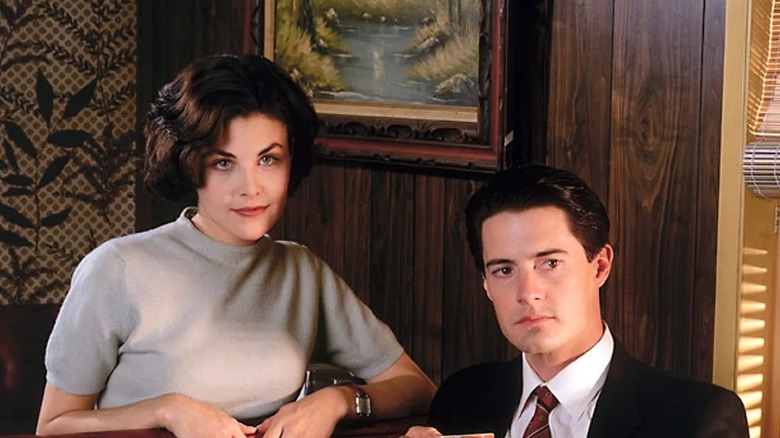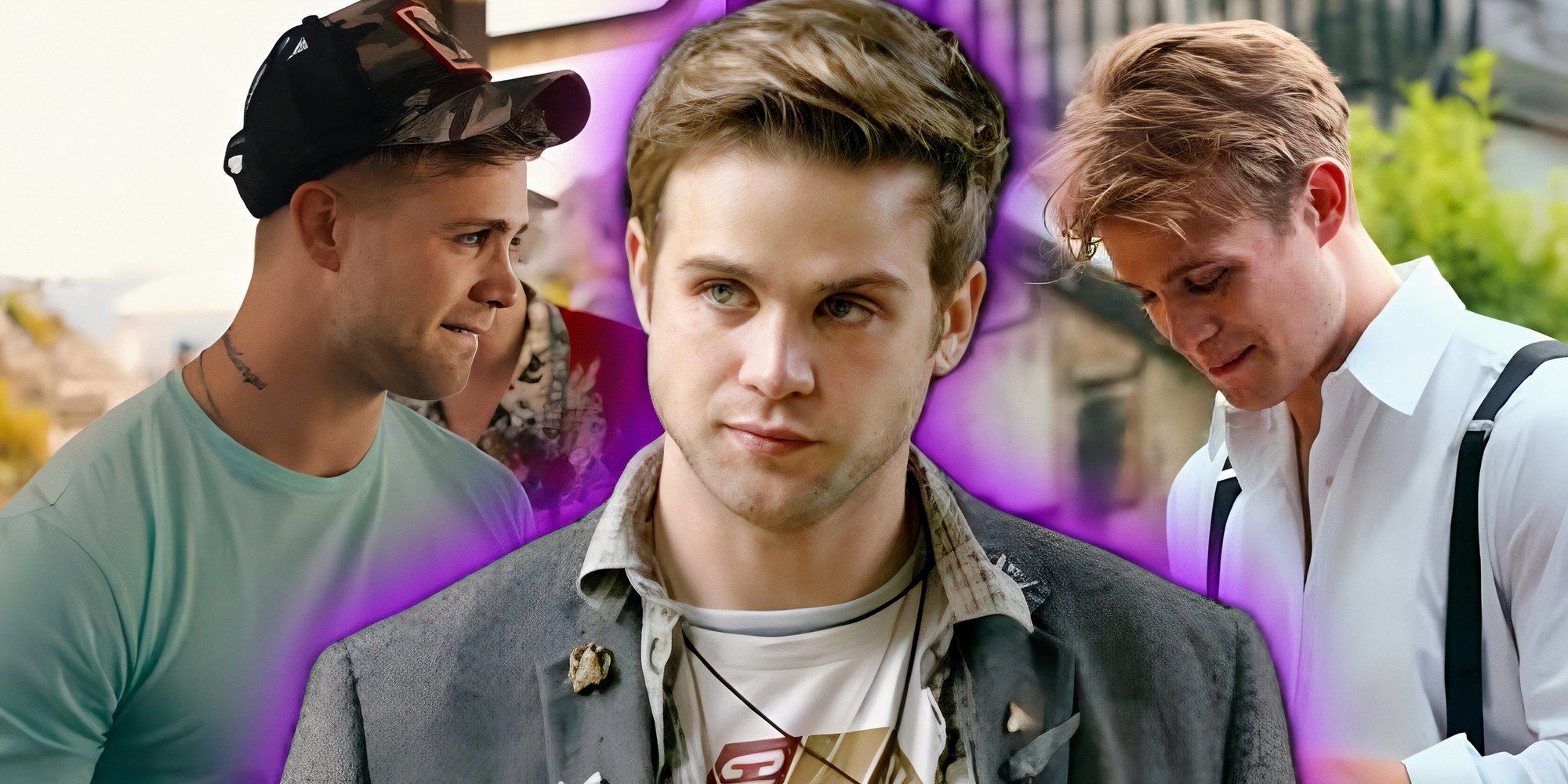
Showtime
The world is a worse place now that we've lost the iconic filmmaker David Lynch. Dead at 78, Lynch quickly was able to establish himself as perhaps the premier and the most famous avant-garde filmmaker of his generation, thanks to such quintessentially off-kilter films as "Eraserhead," "Blue Velvet," and "The Elephant Man." But just as "Blue Velvet" upended an '80s-era vision of American suburbia as an idyll in which the nuclear family could grow and prosper, Lynch was able to fully change the landscape of the small screen during his time as an artist. His chief (but not only) entry into the world of television was "Twin Peaks," a genre-bending drama he co-created with Mark Frost that brought together a massive ensemble cast, used a small-town murder as a jumping-off point into a depiction of man's capacity for good and evil, and ended up inspiring countless shows in the following decades. "Twin Peaks" wound up as a perfect blend of the important, the odd, and the unforgettable.
When it first began airing on ABC on April 8, 1990, the premise of "Twin Peaks" seemed pretty straightforward. A beautiful young woman named Laura Palmer (Sheryl Lee) has been murdered, and FBI Agent Dale Cooper (Kyle MacLachlan) has arrived in the eponymous small town to investigate and hopefully arrest her killer. Any good detective story has more going on underneath the surface, and anyone who knew Lynch from "Blue Velvet" (with MacLachlan as the lead) was not surprised that Palmer's killing was the tip of an iceberg. Cooper, through his investigation, would learn about the seedy underbelly of Twin Peaks, the double life that Palmer led, and the many other odd goings-on in the town. (Plus, he would enjoy a fine few slices of damn good cherry pie.) Although Lynch had found success in the film world, it's almost difficult now to imagine just how huge the two-hour premiere, known as "Northwest Passage," was, netting more than 34 million viewers. None of the future episodes were quite so big in terms of viewership, but the eight-episode first season (a midseason airing) was indeed very big.
Twin Peaks provided more questions than answers

ABC
In films like "Blue Velvet" and "Mulholland Dr.," Lynch has proven himself vastly adept at creating scenarios that pose maddening, compelling, troubling questions, questions that often don't have easy answers if they have answers at all. Arguably, what makes questions like "Who killed Laura Palmer?" so troubling is the fact that the answers are next to impossible to suss out. But while viewers were initially fascinated and drawn to "Twin Peaks," the ratings dwindled somewhat to the point where ABC execs, including future CEO of the Walt Disney Company Bob Iger, demanded that Lynch and his writing team get to the point and actually tell viewers who killed the young woman in a critical second-season episode that aired in November of 1990. Although there were still plenty of committed fans, the show's ratings never hit the same high and Iger (then the president of ABC Entertainment) canceled the show after its second season.
Even initially, though, "Twin Peaks" had served as something of a creative earthquake in Hollywood. Though the ratings never got as high as the premiere, it was evident that a wider audience was willing to enjoy strange, off-putting, enigmatic material on network TV (as well as in the burgeoning cable- and pay-TV landscapes). It's often easy to know how successful one piece of art is these days, specifically because it will often inspire would-be pretenders, copycat shows and films that seem too lazy to work. But in the case of "Twin Peaks," some of the shows that took key inspiration from its intentionally obfuscating style and blend of genres are among the best of their kind and took years to come together. Sometimes, the connections are obvious; a show like Fox's "The X-Files" may have been largely procedural, but Fox Mulder felt cut from the same cloth as Dale Cooper, especially in his deadpan style and desire to get the truth no matter how. (And like "Twin Peaks," "The X-Files" made the leap from the small to the silver screen, while also drawing plenty of attention for its long-form mysteries and romantic relationships.) When ABC went back to the genre-bending well in 2004 with its incredible and still-divisive show "Lost," it was as if J.J. Abrams, Damon Lindelof, and Carlton Cuse were paying homage week after week to Lynch's work, especially once the mysterious Dharma Initiative was introduced in the second season, one of many new questions viewers had to pore over.
The influence runs even deeper, though, beyond those sci-fi programs. Kids of the 2010s could thrill to the Disney animated series "Gravity Falls," which was a high-octane and fast-paced blend of goofy humor, familial strife, and oddball weirdness in the Pacific Northwest that culminated in a battle between good and evil, the latter symbolized by a strange, chatty, yellow triangle of sorts, an image that would have felt right at home in the mysterious Black Lodge of "Twin Peaks." Series creator Alex Hirsch was never shy in acknowledging the reference point, either. And even the mid-2000s procedural comedy "Psych" was made by fans of the show, to the point where a fifth-season episode, "Dual Spires," was a deliberate homage, featuring many of its cast members as guests.
What would the television landscape look like without Twin Peaks?

ABC
What would the television landscape look like without "Twin Peaks"? It's just one piece of the legacy that David Lynch is leaving behind now that he's moved on to a better place. Even when Lynch decided to follow in the footsteps of other creators, bringing the show back for an extended third season of 18 episodes on Showtime in 2017, it felt both very much the same and extremely, extremely different from the 1990s-era version of the show. Yes, other shows had been rebooted in the 2010s, but none of them felt like "Twin Peaks: The Return." Much of the cast was back, there was still a general arc of sorts following up on the second-season cliffhanger of Cooper being trapped in the Black Lodge by a demon who had possessed his body on Earth, but the third season was among the most ambitious, the most terrifying, and the oddest pieces of television ever created. Even amidst other shows that flattered themselves by seeming a bit off-kilter, even in a far-flung TV landscape with streaming services aplenty, Lynch had managed to stand apart as a creative giant.
And now, sadly, he's gone. The influence that "Twin Peaks" has left, though, hasn't gone away at all. This week marks the return of the Apple TV+ sci-fi thriller "Severance," which also owes a heavy debt to "Twin Peaks" in its own way, and there are plenty of other shows in the interim that have existed because their creators were inspired by the story of Dale Cooper, a small town in the Pacific Northwest, and a simple question whose answers are incredibly twisted and thorny. The world is not better for the loss of David Lynch, but it's a testament to his talent and singular style that we'll be feeling his impact for decades to come thanks, in no small part, to the world of "Twin Peaks."









 English (US) ·
English (US) ·